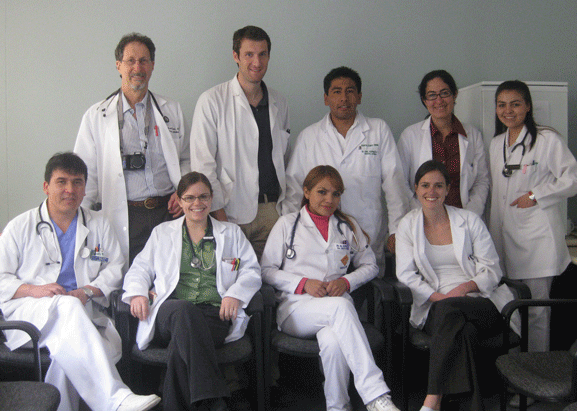 |
|
| Members of the UMMS group with their Bolivian colleagues. Back row, attending Brant Viner, MD, far left; Matthew Tyler, SOM ’12, second from left; infectious disease fellow Wayra Salazar, MD, second from right. Front row, Rebecca Ackroyd, SOM ’12, second from left; Jennifer Kenning, SOM ’12, far right. | |
Treating infectious diseases in a tropical, developing country is quite different than treating infectious diseases in most of the United States. Diseases seen on a daily basis in countries such as Bolivia or the Dominican Republic—dengue fever, typhoid or malaria, for example—are encountered rarely in the typical U.S. hospital. This can present a challenge for medical students interested in getting hands-on experience in the care and treatment of some of the world’s most common infections.
To address that challenge, three UMass Medical School students recently traveled to Bolivia to complete an elective infectious disease rotation, becoming integral members of medical teams at Hospital Viedma in the village of Cochabamba under the guidance of attending UMMS physicians. In this unique international exchange, the students learned from the Bolivian care givers who routinely treated cases that would be considered exotic in the United States, and in return, UMMS physicians taught Bolivian health care providers about the intricacies of administering the complex anti-retroviral drugs that combat HIV/AIDS infections.
For organizer Douglas Golenbock, MD, professor of medicine and microbiology & physiological systems, the dual purpose of the four-week trip made the effort satisfying.
“In poorer countries, you don’t really have infectious disease specialists—they are simply medical providers with little time for extra training,” said Dr. Golenbock. “The World Health Organization and the Global Fund are providing cheaper anti-retrovirus drugs to these countries to treat the wide-spread HIV/AIDS problem, but the doctors don’t have proper training to prescribe them. Not following the correct protocol is how you get drug resistance, which defeats the whole purpose.”
Colleagues Mireya Wessolossky, MD, associate professor of medicine, and Raul Davaro, MD, clinical associate professor, taught a one-week course to 80 Bolivian practitioners—as well as the three UMMS students—that was well appreciated in a medical system that has little time or money for professional development. And in exchange, the Bolivian physicians shared their knowledge with the UMMS students, who, in addition to joining treatment teams, presented, rounded and treated patients alongside their hosts.
“Our students had the opportunity to see lots of unusual diseases, and they got lots of one-one-one attention from their [UMMS] attendings, which doesn’t usually happen in normal rotations,” said Golenbock. Besides Drs. Wessolossky and Davaro, Wayra Salazar, MD, an infectious disease fellow in the division of infectious diseases and immunology, and Brant Viner, MD, clinical associate professor of medicine, served as attending physicians.
“You can never learn as much from a book as you can from an actual patient,” said fourth-year medical student Rebecca Ackroyd, who recently learned she matched in a pediatrics residency at Tufts Medical Center in Boston. “When you actually treat a patient, what you learn sticks in your brain. There’s no better way to learn. Otherwise, it’s just rote memorization.”
While Ackroyd and her fellow students Matthew Tyler and Jennifer Crombie were fluent in conversational Spanish, presenting an academic medical case in another language proved to be challenging. Ackroyd also spent time in the pediatrics ward, performing procedures such as starting IVs on dehydrated babies that normally would be handled by auxiliary services in U.S. hospitals
“I learned so much about infectious diseases because of all the crazy cases we were seeing on a daily basis,” said Ackroyd, whose career goal is to work with underserved populations that may include immigrants from developing countries. “And we learned how to manage these diseases that we normally wouldn’t see.”
This is the program’s third year, but the first in Bolivia. The team traveled to the Dominican Republic for the first two years, but moved to Bolivia—Dr. Salazar’s home country—because the Bolivians quickly embraced the educational exchange concept and were happy to host. Golenbock said would like to continue the rotation next year if the funding materializes.
“I would love to keep it going, if not in Bolivia than in another location,” he said, noting the vital financial support of the Office of Global Health’s Katherine Luzuriaga, MD, professor of pediatrics and medicine and associate provost of global health, and the office of Terence R. Flotte, the Celia and Isaac Haidak Professor of Medicine, executive deputy chancellor, provost, dean of the School of Medicine. “Bolivia is one of the poorest countries I’ve been to in a long time and the doctors were delighted to have us.”